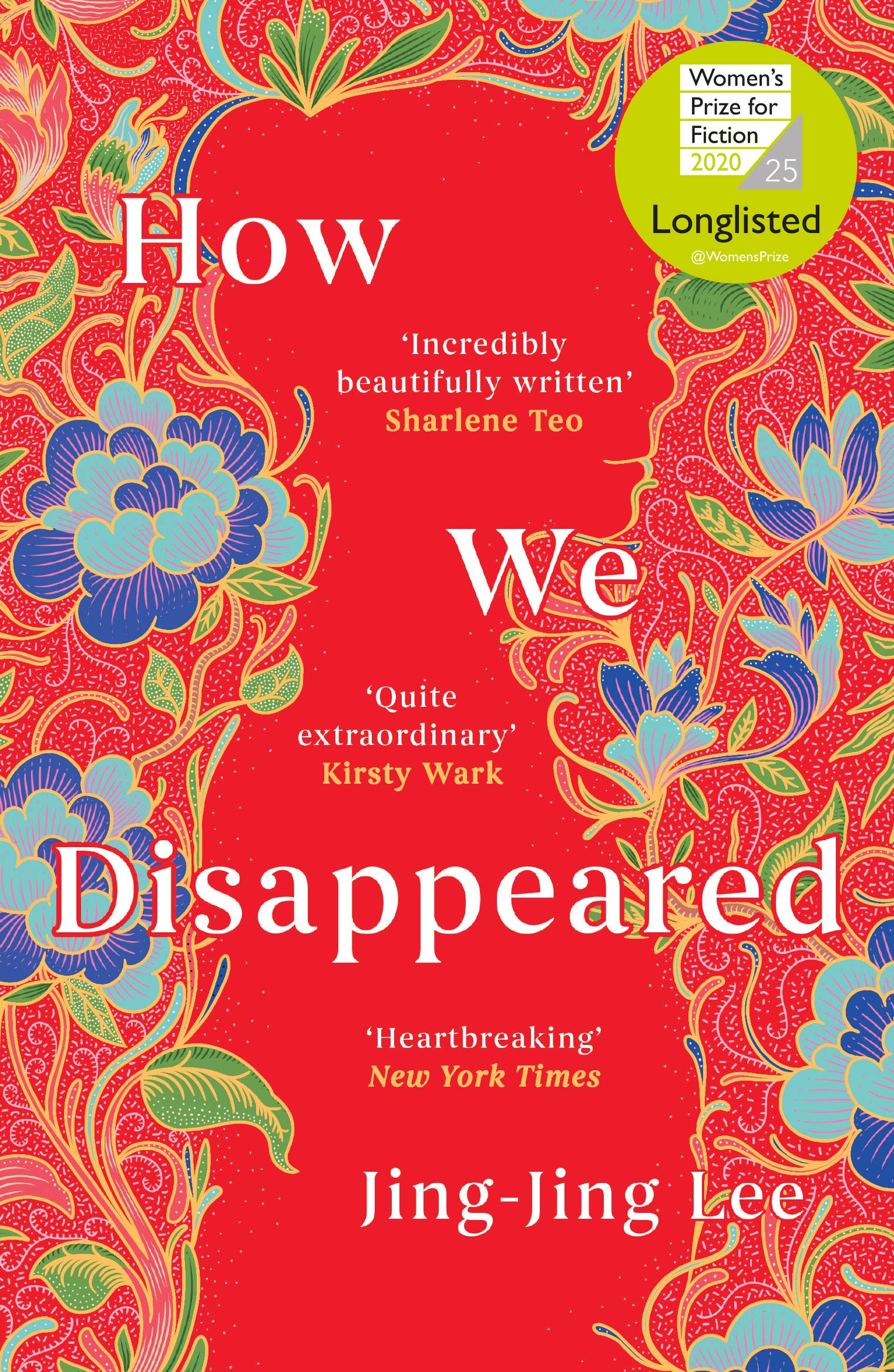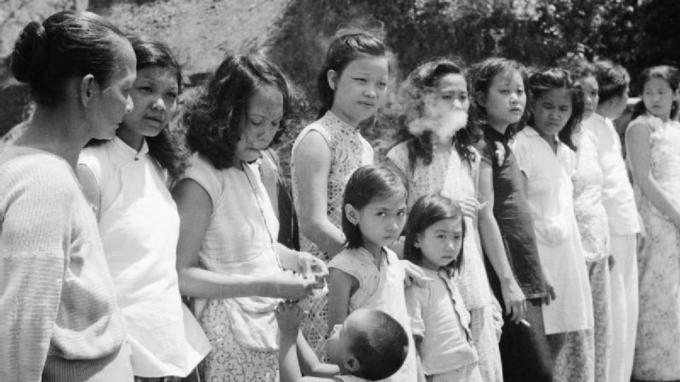Sometimes all you had to do to get someone to talk was to be silent.
And so Kevin did, as he listened to Wang Di’s accounts on her experience during the World War II, as the Japanese imperial army invaded her homeland Singapore and took her away from the comfort of her parents’ home.

I already know how gripping this book would be as I first read the book’s summary–the main reason why I bought the book. The main protagonist, Wang Di, was taken by the soldiers to serve as one of comfort women in her homeland Singapore. It became a very painful memory, one that has taken her a long time to finally open up and talk about, long after her husband’s death, even though he’d been patient enough to wait for her to tell him herself.
Comfort women is a euphemism used for sex slaves, which refers to girls and women forcibly taken by Japanese soldiers in East Asia and Southeast Asia, to provide sex for Japanese soldiers at designated comfort stations across the occupied territory during the World War II. The Japanese government sanctioned this action to prevent further atrocities such as the mass rape in Nanking and prevent venereal diseases amongst its soldiers, to maintain Japan’s image to the international community. The fact that this has done little to prevent diseases from spreading and the length the Japanese government would do in order to maintain their image alone makes me feel sick. They care a lot about the latter including during pandemic, by the way, so is it a surprise that I’m not really surprised by this?
Wang Di’s recollection of her rape after she was taken is disturbing and surreal at the same time, yet I am left thinking over and over how much worse it actually was in reality for survivors.
I would not be able to go back. I would not be able to look my mother or father in the eyes again.
That is what I was thinking about when the third soldier came in, the fourth and fifth. I made myself stop counting after that and kept my eyes closed all the way through each of them, their oil and dirt and rumbling, until they eased their weight off me and left the room.
Wang Di
I learned that many of these girls are between the age of 14 to mid-20s, some of whom had yet to menstruate. And the repercussions for the victims were too great for any compensations that the Japanese government could ever give. Many become sterilized as their vagina tear and could not bear children, many remained unmarried, for being too ashamed of what had been done to them, even if it were being done forcibly. They faced death threats, violence, and starvations. Even doctors assigned to them would rape them, and they were forced to abort if they got pregnant by accident. Despite enforcing precautions such as condoms, as resources become scarce, the sex slaves needed to clean and reuse them, and in Lee’s book, Wang Di recollected soldiers threatening them with pistols and knives for reminding them to use the condoms.
Soldiers made payments in the form of ticket, and many of these girls were tricked into signing up for the work by being told they would work in factories or as nurses for the military, if not being kidnapped from the street for being in the wrong place at the wrong time, these women had hoped that they would receive money or their families would, at least. In reality, it is doubtful if they ever got any.
As if those are not enough sufferings, if death had unfortunately passed them by, and I said this because many considered and committed suicide for the tortures they received, they were either left with nowhere to return to after the war ended and they got liberated, being already too far away from home after being transferred repeatedly to another country, or too ashamed to return home thinking of their supposedly shameful past.
Some things that I found really heartbreaking about their stories are these:
1. They faced stigma wherever they are. If they’d stayed in the country they ended up stranded in, or if they’d gone home, people thought of them as Japanese discards, whores, or pariahs. When I first read this part in the book, I got so shocked, only then to rationalize it by remembering what a different time it was back then. People didn’t seem to care that they’d been either tricked, or taken by force. They only saw what had been done to them, and either thought the girls had done it willingly, or just didn’t care thinking about anything at all. Some got lucky to find men who would understand their pain, but some remained unmarried, thinking of themselves as worthless and as a discarded woman. The treatments they’d received from the people around them breaks my heart, but it’s even more crushing to learn how they viewed themselves. One survivor in Indonesia mentioned how they were taken because they were considered beautiful back then, and after the war, people would say no matter how pretty they were, they’re still the Japanese’s used stuffs. And then she’d wish she’d been ugly, for the ugly ones were sent back after one or two days. Having already been raped, I doubt they’d face less of a stigma but then it also means they wouldn’t be stuck for months or even years at their comfort stations. No women should ever wish they’re ugly because they fear for their lives and future.
2. The outrageous denial that was (or still is?) persistent in Japan. Ultranationalist groups and the Prime Minister Shinzo Abe had repeatedly deny that these comfort women were forced, and after a painstakingly persistent demand, the Japanese parliament started to issue an apology. Yet this has repeatedly caused tension between Japan and South Korea in particular. One former Osaka governor even mentioned how comfort women had been a necessity during wartime. This not only downplayed the importance of acknowledging the existence and pain of these women, but enforced the propaganda from the far-right groups that these comfort women are lies and fabrications to bring down the Japanese government.
I never really understand how people could blatantly deny historical facts when it’s right there in front of their eyes, and their persistent insistence on ignoring them is just amazingly unbelievable. The holocaust has become a widely known fact within the history of World War II and there is a serious repercussions for one to deny its existence, and museums and monuments have been built to commemorate the atrocities against Jewish people by the Nazi Germany. Yet we don’t see any serious repercussions for these people denying or downplaying the comfort women’s issues until today.
3. This is probably the most frustrating one of all: No compensations or issues of comfort women has been highlighted by the Indonesian government. One of the most frustrating things I read is how the effort to demand apologies and suing the Japanese government for compensations have progressed more rapidly because of the local government’s support, but the Indonesian government couldn’t even tracked down most of them since it is deemed too difficult. Eventually local legal organizations tried tracking them in Yogyakarta and found 14 of them but compensations for the Indonesian comfort women were re-directed to build facilities and elderly houses to house senior citizen who lived under the Japanese military occupation, these 14 women included. It breaks my heart every time I read about comfort women and they are mostly represented by China and South Korea. Granted, South Korean and Chinese women made up for the majority of these comfort women, but there had been little discussions and highlights on the struggles of the women from Indonesia, with the exception of Dutch women taken from Dutch East Indies (former Indonesia under Dutch colony).
The Indonesian government does not have a good track record in acknowledging ugly history, so this, unfortunately, does not surprise me anymore, but they certainly has not made enough effort to accommodate and helped these women.
I am glad to have come across Lee’s book, though. It is a beautiful and painful narratives on Singapore’s history during the World War II, and it has encouraged me to read more about the history of comfort women. I had expected it to be a difficult reading since the issue of comfort women is not an easy subject to read and talked about, but Lee’s skillful narrative has eased my reading experience.
Now, whenever we think about Japan and Singapore, as the two countries discussed in this book, we usually think of modern, developed nations, and both have indeed come a long way ever since the war, to become a powerhouse economy in Asia. Yet especially in Japan, seeing how much they have advocated about their own painful history of the Atom bombing that eventually sped up the end of World War II, erecting museums and monuments to commemorate the tragedy, whereas the A-bomb survivors continuously and admirably advocate for a peaceful world free of nuclear bomb, I feel it’s just unfair that no same effort was ever allocated to address the issue of comfort women. It’s such a shame that they force the world to acknowledge the atrocities done to them and their people, but they don’t exert the same effort towards the atrocities committed by them in the past. Yes, it’s a different government back then, and it’s a different situation. It does not mean it should not be addressed. In no way, of course, I am condoning the bombing of Hiroshima and Nagasaki. No one should ever undergo such sufferings ever again, in the future (looking at you Saudi Arabia in Yemen), but we should owe it to the younger generations to continuously inform them of what happened in the past, to ensure that the future would never be as painful, especially for women. Stories like this, even if it’s fictional, could create a powerful narrative, and a pathway for us to remain curious so we dig deeper to find out about the past that should not be forgotten but learned. And Jing-jing Lee’s book is one that provides that path.
If you’d like to read more about comfort women and their histories, please check these sources I used:
- https://www.history.com/news/comfort-women-japan-military-brothels-korea
- https://www.dw.com/en/former-comfort-woman-tells-uncomforting-story/a-17060384
- http://www.awf.or.jp/e3/indonesia-00.html
- http://www.awf.or.jp/e3/oralhistory-00.html
- https://www.washingtonpost.com/local/70-years-later-a-korean-comfort-woman-demands-apology-from-japan/2015/04/22/d1cf8794-e7ab-11e4-9767-6276fc9b0ada_story.html
- https://www.comfort-women.org
- http://www.awf.or.jp/e1/facts-12.html
- https://www.liputan6.com/global/read/4131026/6-fakta-budak-seks-tentara-jepang-saat-perang-dunia-ii
- https://www.youtube.com/watch?v=qsT97ax_Xb0&vl=en
- https://tirto.id/jugun-ianfu-budak-wanita-di-masa-penjajahan-jepang-cgZz
- https://www.vice.com/id_id/article/nepyxz/karena-kami-cantik-penyintas-perbudakan-seksual-jepang-di-indonesia-tak-kunjung-dapat-keadilan
- https://en.wikipedia.org/wiki/Comfort_women
